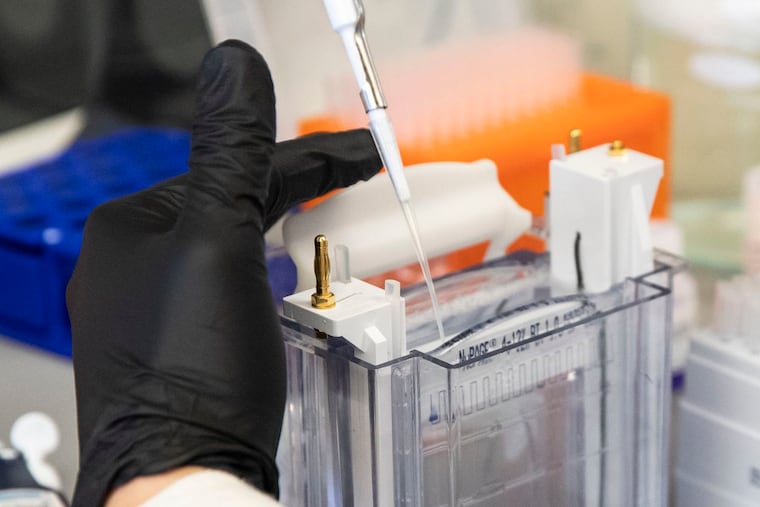Penn medical school is giving COVID-19 vaccine priority to employees who don’t see patients. Philly says that’s against the rules.
The city places higher-education employees in phase 1c of the vaccine rollout, but Perelman told staff that the school is placing that group in phase 1b.

The University of Pennsylvania’s Perelman School of Medicine is planning to allow faculty, postdoctoral fellows, and other academic employees who do not have contact with patients to receive the COVID-19 vaccine in the second phase of distribution. That’s an apparent violation of Philadelphia’s prioritization plans but fits a federal recommendation, illustrating another way the vaccine rollout has been fraught with confusion.
The city places higher-education employees in phase 1c of the vaccine rollout, which also includes people in the general population who are 65 to 75 years old. But Perelman last week sent an email informing staff that the school is placing that group in phase 1b.
“PSOM faculty, post-doctoral fellows, staff, and students in clinical and basic science departments who are not engaged in patient care or enrolling patients in clinical research studies will receive invitations to schedule an appointment for the COVID-19 vaccine based on the [U.S. Centers for Disease Control and Prevention] recommendations for Phase 1b,” the Jan. 12 email said.
Philadelphia’s public health agency maintains that Penn cannot circumvent its prioritization plans, and the discord between the city and Penn’s plans is one of many thorny ethical situations that have arisen across the country over administering limited supplies of the vaccine. Though federal health officials have issued guidance, the Trump administration left it to local governments to administer the pandemic response, creating a patchwork of rules.
Many people who work in hospitals but have no patient contact, such as administrators, have been vaccinated in the first phase of distribution against local guidance, the New York Times has reported. Conversely, people with underlying health conditions that could make them more vulnerable to COVID-19 must wait until phases 1b or 1c, depending on where they live.
Others who are not high-risk are simply “jumping the line” by signing up to be inoculated by pharmacies with links forwarded to them by friends or family members in prioritized groups, The Inquirer has reported.
Temple University’s Lewis Katz School of Medicine and Jefferson University did not respond to inquiries about their policies on vaccinating staff who don’t interact with patients. But as the Times reported last week, numerous institutions, including Columbia University, New York University, Harvard, and Vanderbilt, are giving vaccines to employees who don’t have front-line worker status.
The Philadelphia Department of Public Health orders vaccines from the federal government for hospitals, which are supposed to follow the city’s rules for distribution, said Jim Garrow, a spokesperson for the department. Currently, health-care workers who have direct contact with patients are being vaccinated as part of phase 1a. The rules do not allow academic staff in higher education who have no patient contact to be vaccinated until 1c, Garrow said.
“We define health-care workers as people who have direct exposure to patients, so this includes not just doctors and nurses, obviously, but also front desk staff,” he said. “A professor sitting in his office in a whole other building is not considered a health-care worker.”
Garrow said that the city would stop ordering vaccines for providers who were “repeatedly and willfully not following the prioritization scheme.”
P.J. Brennan, Penn’s chief medical officer, said in a series of statements to The Inquirer that the institution is working closely with the city but is following the CDC guidelines for Perelman staff.
“The memo reflects the CDC’s priority rubric for group 1b, which informs our plans along with the more specific guidance from the city of Philadelphia that outlines when individuals in specific jobs within our academic health system, or based on age and pre-existing conditions and other factors, can be vaccinated,” Brennan said. “There are multiple, evolving layers of guidance from the federal, state, and city level, and we continue to adapt our plans accordingly and collaborate closely with the city. We are united in our shared goals to ensure that all available vaccine is given to priority groups.”
One Perelman professor who would benefit from the new policy does not agree with the school’s decision to prioritize faculty who don’t see patients.
“It’s surprising, given all the care and thought the university put into the early part of the prioritization, to see this quick change,” said the professor, who was not authorized to publicly discuss the vaccine program and feared loss of a job if identified by name. “Many of my colleagues are at very low risk of infection. And it seems like it’s gone from a very careful thought-out process to just a free-for-all, and that leads to inequities.”